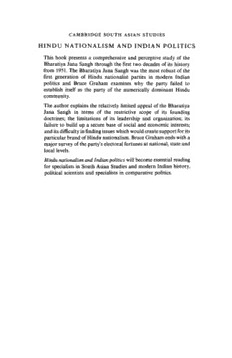
Hindu Nationalism and Indian Politics: The Origins and Development of the Bharatiya Jana Sangh PDF
295 Pages·1990·8.856 MB·English
Most books are stored in the elastic cloud where traffic is expensive. For this reason, we have a limit on daily download.
Preview Hindu Nationalism and Indian Politics: The Origins and Development of the Bharatiya Jana Sangh
Description:
This book presents a comprehensive and perceptive study of the Bharatiya Jana Sangh through the first two decades of its history from 1951. The Bharatiya Jana Sangh was the most robust of the first generation of Hindu nationalist parties in modern Indian politics and Bruce Graham examines why the party failed to establish itself as the party of the numerically dominant Hindu community. The author explains the relatively limited appeal of the Bharatiya Jana Sangh in terms of the restrictive scope of its founding doctrines; the limitations of its leadership and organization; its failure to build up a secure base of social and economic interests; and its difficulty in finding issues which would create support for its particular brand of Hindu nationalism. Bruce Graham ends with a major survey of the party's electoral fortunes at national, state and local levels.
See more
The list of books you might like
Most books are stored in the elastic cloud where traffic is expensive. For this reason, we have a limit on daily download.
